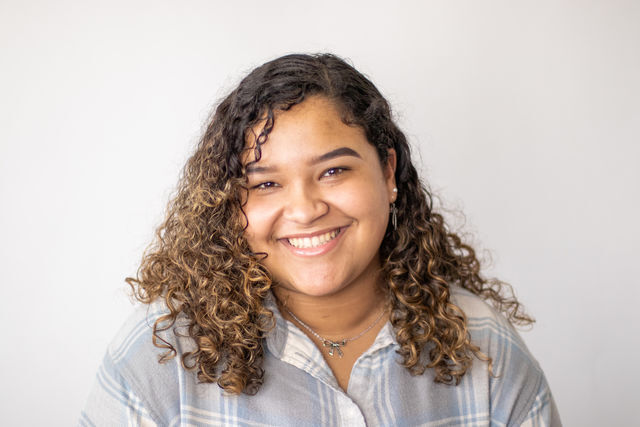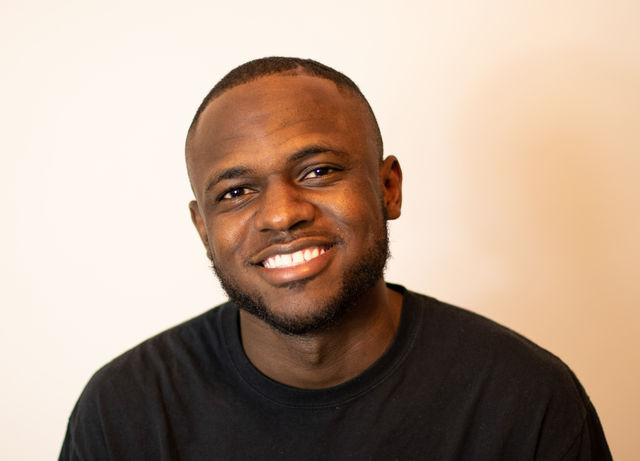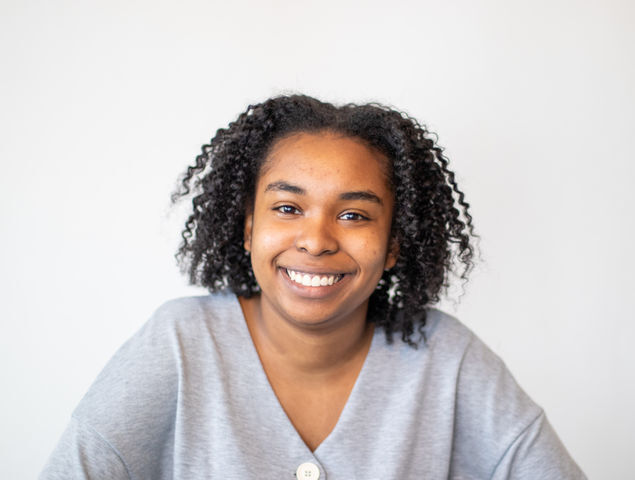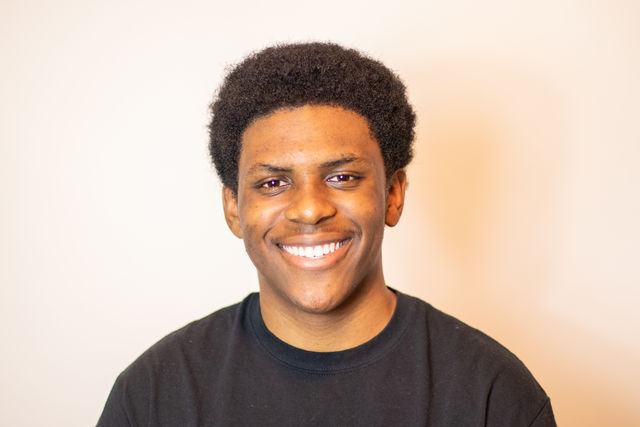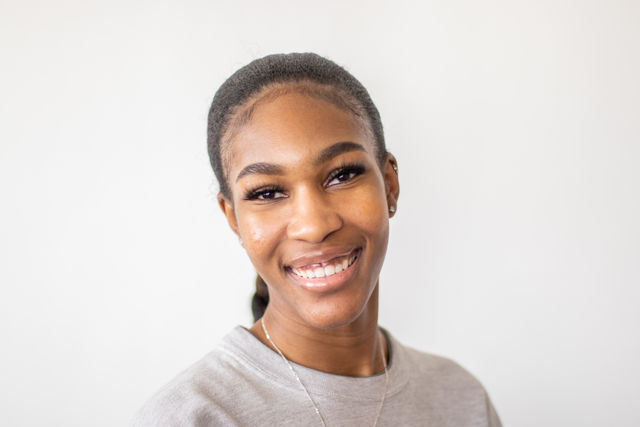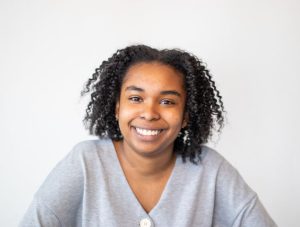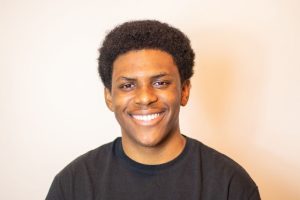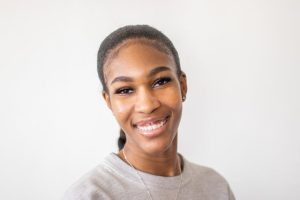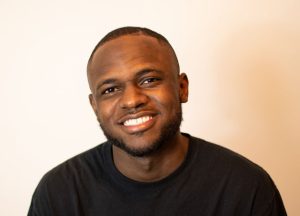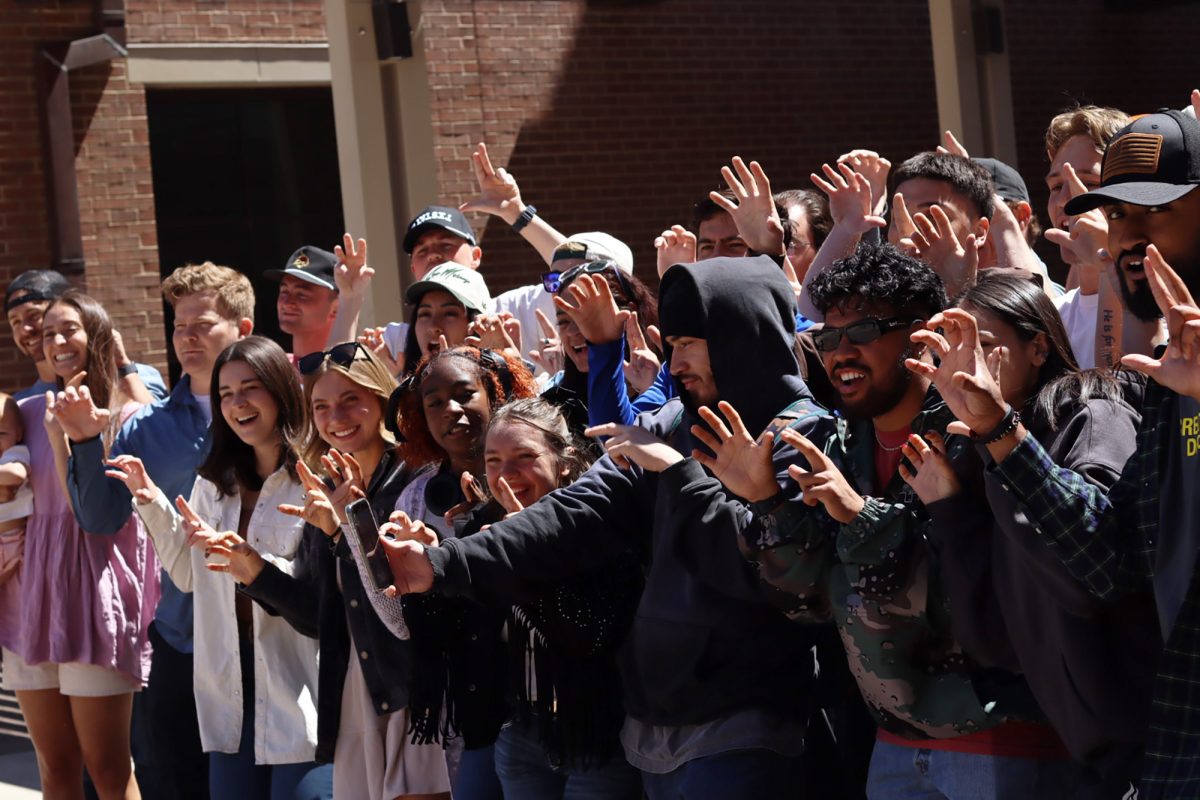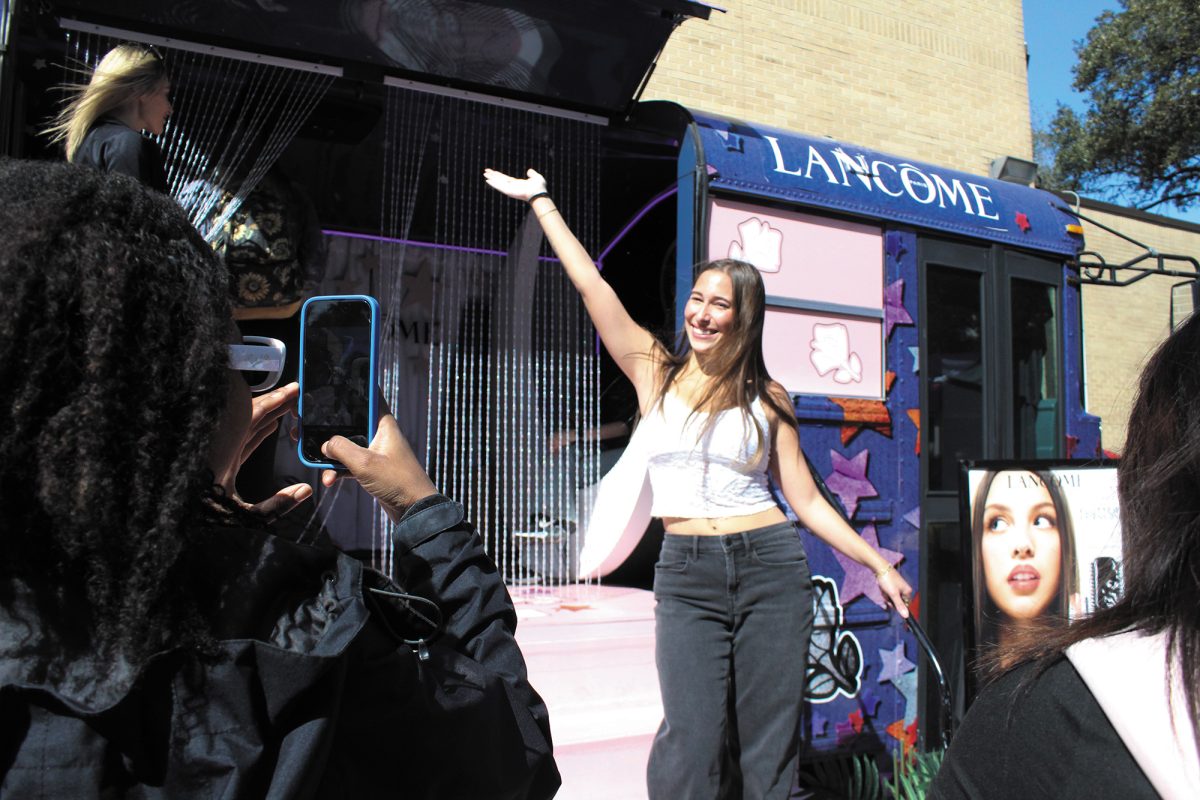Every day, the editors at The University Star work to provide important news and interesting content, but what about the faces and personalities behind the bylines? Under former Editor-in-Chief Jaden Edison, more than half of the 2020-21 editorial board was Black, despite the 11% population of Black students at Texas State.
I sat down with former and current Black editors at The Star and asked them about their time at The Star, what it’s like being a Black editor and any advice they would give to other Black students.
Meet Cristela Jones, Hannah Thompson, Kim Davis Jr., Eryka Thompson and Jaden Edison — members of the team responsible for covering Texas State and San Marcos during the 2020-21 school year.
Cristela Jones
Cristela Jones, former life and arts editor and electronic media senior, joined The Star amid the COVID-19 pandemic. While at The Star, Jones wrote stories highlighting local businesses, theater, fashion, Black beauty and marginalized students — enlivening the life and arts section through her personality and content. Jones will graduate this summer and will attend graduate school at the University of Texas in the fall.
How has working at The Star helped you grow as a person?
I think working at The Star has allowed me to improve my critical thinking skills and manage my time more efficiently since I have to manage meetings, incoming stories and anything going on with my team, so, though it’s definitely been a learning process, I love doing it!
What is the most important advice you could give to other Black students?
I would say to not be afraid to go beyond your comfort zone and take on leadership positions. I’ve always been hesitant about seeing myself move up in an organization or a company because I don’t see people who look like me working in higher positions, but I think it’s important to be the first to change the narrative and start doing things in a different way.
What’s the most exciting thing happening in your section?
A lot of really cool stories on students and faculty of color. My team has done an exceptional job at writing stories that tug at people’s heartstrings and leave them wanting more, so I really want life and arts to continue bringing a smile to people’s faces now and even after I’m gone. People deserve to be heard and represented.
Hannah Thompson
Hannah Thompson, multimedia editor and history senior, has grown throughout her years at The Star. She started in fall 2019 as a multimedia reporter, moved her way up to assistant multimedia editor and now serves as the organization’s multimedia editor. Thompson is passionate about journalism and leads her section to create The Star‘s video, audio and photo projects.
Why did you come to The Star?
Throughout high school, I wanted to work in the field of journalism. I was a part of many clubs and extracurricular activities that had to do with journalism or multimedia. For example, I was the head writer for Raptor News, my high school’s news show, and I was also the editor-in-chief of the Yearbook Club. I like to do things that bring me closer to my future goals, so I decided that in college I would continue this trend, joining things relevant to journalism. During Bobcat Preview, I went to an event showcasing different clubs, and I decided to sign up for multimedia at The Star.
What’s the best part about being an editor at The Star?
I think one of my favorite parts of being an editor is being able to share the wisdom that past editors have given to me, helping people grow in various skillsets. However, I’d have to say that my most favorite part is seeing people’s work published in print. Every new production day, the first thing I do is grab last week’s paper to take home. I know my team puts a lot of effort into learning angles and getting visuals, so it means a lot to me to see the final physical product.
What is the most important advice you could give to other Black students?
I think the most important advice I could give to other Black students is to find mentors that can help you grow and cheer you on. Imposter syndrome can really hold people back, so having a leader who you can relate to and confide in can be helpful.
Kim Davis Jr.
Kim Davis Jr., podcast editor and electronic media senior, has been with The Star for a year and has already made a huge impact. He built the entire podcast section from the ground up and started the organization’s weekly podcast, “The Star Sitdown,” which features guests such as students, professors, members of The Star and most notably, Beto O’Rourke. He also launched the section’s “Winddown Wednesday” series, a short weekly audio series that promotes mental and physical wellness.
What’s the best part about being an editor at The Star?
The best part about being an editor, to me, is being around incredibly passionate people on the editorial board and making connections that I know will last me a lifetime. Being an editor during the pandemic has proven to be a difficult task, but having other people on the editorial board to talk to regularly and keep up with has helped me, and I don’t feel as alone.
How has working at The Star helped you grow as a person?
The Star has helped me grow as a person by giving me more empathy. As an editorial team, it’s been fascinating to see how different people think and how different people’s upbringing impacts the way that they think and react to certain things. Learning from other’s experiences and hearing what others have gone through has taught me more of the importance of empathy and understanding; not everyone thinks like me or has the same ambitions as me.
Do you have a Black role model/inspiration at The Star, in the past or present?
If I had to choose a person it’d definitely be Jaden Edison. He’s the person who hired me for multimedia, he’s the person who offered me the job of podcast editor, and he’s the one who makes me want to push harder and excel myself towards success. Jaden and I are very like-minded with how we “move”, and we always try and execute at a high level. I think that’s why we get along and why he’s the closest friend I have on the editorial board. Since he’s a little older than me, I’m able to look at certain areas that he’s excelled at, and I try to set the bar even higher than where he landed.
How does it feel having other Black members on the editorial board?
It’s incredibly important to me and something that I’m incredibly happy about. Considering Texas State doesn’t have many Black people, it feels great that the editorial board has so many Black people; people that understand each other on a basic level and have each other’s backs. There have been times where colleagues who aren’t Black utter something that’s ignorant, and the Black editorial board members had each other’s backs in addressing the situation and its problematic nature.
In a way, I feel very privileged and spoiled by the Black representation on our editorial board because I don’t know if I’ll ever have so many other Black coworkers beside me in positions of power. In summation, having Black people on the editorial board is something that I cherish and will never take for granted. When I’m older and reminisce about my time at The University Star, that’s something that I’ll remember the most.
Eryka Thompson
Eryka Thompson, engagement editor and public relations senior, joined The Star last summer. She started off as a public relations assistant but was offered the position of engagement editor where she manages the organization’s social media accounts and weekly newsletter.
Why did you come to The Star?
I came to The Star for a few reasons, but, mainly, because I was intimidated by my peers. I graduated high school with my associate degree, so I entered college as a junior. In most of my classes, I was too afraid to raise my hand or speak up, and I often felt like it wasn’t my place to offer suggestions or ideas in group settings or small lectures. Knowing that a majority of my classmates from spring ’20 onward would be older than me, and therefore more experienced than me, really got my gears turning. As I result, I told myself to find as many ways to build my resume as possible. I was under the impression that because they were older than me, I would be overlooked, but, in hindsight, I realize that was a naive mindset. I’ve always kind of felt like experience is everything in the real world.
How has The Star changed since you’ve joined?
I’ve seen major changes in the amount of support shown at The Star. I feel like we’re all at a place where we are comfortable giving constructive criticism to better the staff as a whole, and we really act like a family.
What is the most important advice you could give to other Black students?
If there is no seat at the table, make one.
Do you have a Black role model/inspiration at The Star, in the past or present?
I think my Black role model is Jaden Edison, our editor-in-chief. I was hired not long after he started this position, and I remember on day one of training telling my mom how excited I was to have a Black editor. It was so refreshing to see some representation at the top.
Jaden Edison
Jaden Edison, former editor-in-chief and electronic media alumnus, was with The Star for three and a half years before he graduated in spring 2021. He started in the opinions section, then moved to multimedia — becoming the section’s assistant editor, then multimedia editor — and, finally, was selected as editor-in-chief. His legacy at The Star will be remembered by many people, especially his editorial board.
What’s the best part about being an editor at The Star?
I think working with the other editors and staff members: that’s the cool part. Whenever you become editor-in-chief, the job becomes less about you and more about everyone else. So, what can I do to help everybody else, right? As a reporter, I’m focused on my craft to try to help out the organization, and, as a section editor, you’re really focused only on your section.
As editor-in-chief, you’re worried about everybody’s roles; you want everybody to come here and succeed and have great experiences here. So that’s been the great part, is being able to just meet so many great people through all my years, you know?
Being an editor, or even as editor-in-chief, some of my best friends nowadays are people who I met at The Star just because we spend so much time here, and we’re together. Just seeing some of the relationships we have on the editorial board; that’s all rooted in the time we spent at The Star. I think we just have a lot in common, you know, and The Star is the one thing that helps bring this all together. You’re able to learn that you learn so much just by watching how people respond to stuff. I always want to be in a place where you have a positive impact on everybody, connecting with everyone and being able to be a mentor.
How has The Star changed since you’ve joined?
I joined in 2018 when you’d walk into the newsroom and nobody could say a word if they didn’t know you, it kind of just felt so separated. I don’t recall having socials like we have now; I don’t remember a lot of that. And I do remember there was this sense of internal competition on the editorial board and things of that nature, just based on from the outside looking in, but it never felt like a family.
I think over the last two years, starting with Carrington, it was a really big goal of his to change the culture of The Star and our processes and procedures and whatnot. But, I really think these last few years we’ve been able to really improve the culture of The Star and make this a place where people feel privileged to be here.
I think we’ve become a lot more detailed of an organization. If you can look at stories from years past, you know, there are always areas where we could’ve improved when it came to our attention to detail, how we did things, how we treated each other internally and how we communicated with our audience. We’ve been able to really make positive steps in that direction over the last three and a half years since I’ve been here. It’s really a credit to everybody that’s been here over the last three and a half years because it takes personal investment to sort of buy into that.
But I think our culture has improved tremendously. I think our content has improved tremendously and the quality of people we have here has improved tremendously. Not to say that anybody was a bad person before per se, but it’s all about how things fit together. In an editorial board, you want to have the right people who sort of buy into that overall goal that you have.
Once you can do that, then the rest of it takes care of itself. So it’s been improved a lot. I just remember walking in the newsroom and all the freshmen and I felt like ‘Is anyone gonna say anything to me?’ I was just sitting with my section editor at first and now, if you come to hang out with us for a little bit, Cristela might invite you to brunch. Like that’s just how it works now. So yeah. I like to think that we’re more of a family-like environment.
What is the most important advice you could give to other Black students?
The biggest thing is just try everything. I think for me, the best thing I’ve been able to do with The Star is dip into every area, every section, because I mean, think about it, we know that Black people are disproportionately impacted by — you can look at any area, any sector of this earth, and you’ll find a disproportionate impact, a negative impact on Black people, whether it’s in higher education, healthcare, mass incarceration, you can go on and on.
There are just certain systemic forces that you won’t ever be able to really takedown because they’re so strong and it’s going to take a collective effort; it took centuries to build those things, and it’s going to take more centuries to tear them down. But I will say what we can do to sort of equip ourselves in that is being able to diversify our skill sets. So, if you’re talking about journalism, know how to take photos, know how to write, know how to be intellectually curious and, you know, do the readings. Know how to work social media, know a little bit of how the business and the money works if you can, try to dip into everything you can, cause that’s gonna help you.
I say this to everybody all the time, and you never want to be the person in the room that doesn’t have a clue, and you always want to know sort of what’s going on. So I think, you know, especially for us Black women and men, we can be so powerful, and, sadly, we have to sort of go the extra mile to be half as considered, half as qualified as our white counterparts might be in these different fields.
But, I think in the long run having to always go the extra mile makes us better, it makes us better in our respective fields. So, I would say just be that person. Everything you’re doing: be intentional, know why you’re doing it and never settle for less.
I think, oftentimes, and I’ve been guilty of this in the past, you know, ‘I’ll do this, it’s just a good deed, I don’t need to get compensated for this.’ But no, I think we’re in a place now where these systems are going to take everything they can away from us. So, we need to treat them the same and never settle for less.
So diversify your skillset and don’t settle for less. That would be my advice to any sort of Black staff member at The Star and any Black student in general, is to always find ways to improve. You get good at one thing, it’s not good enough, go find something else to get a foundation. So that’ll be my advice.
How does it feel to have Black members on the editorial board?
It’s great, it’s great, I think oftentimes you get in these predominantly white spaces, you’ve got to codeswitch and do all that stuff, but it’s been really cool because I think sometimes we run into things and sometimes, you know, I’ve grown up before where I was the only Black person in an entire class, I’ve gotten so used to it.
But there’s real value in having Black voices and Black bodies present, because you’re not always the only person sort of speaking your language, for lack of a better term. Even this year, during my term as editor-in-chief, there were times where I went to just our Black editors and tried to walk through situations with them, in particular, because I knew they would be able to understand where I was coming from and what I was thinking. I don’t think that’s a perspective that you have when you don’t have a Black presence. So, it means so much.
This organization beyond me has benefited so much more than most people probably ever know. This organization has really benefited from having minds like Carrington, you know, who we have on our team now, Eryka, Kim, Hannah, and all these great people, I think our organization has really benefited long term because of people like that. People who are Black. I think we have had a strong presence at this organization, and this organization is going to benefit for years to come because of the contributions of those respective people.



